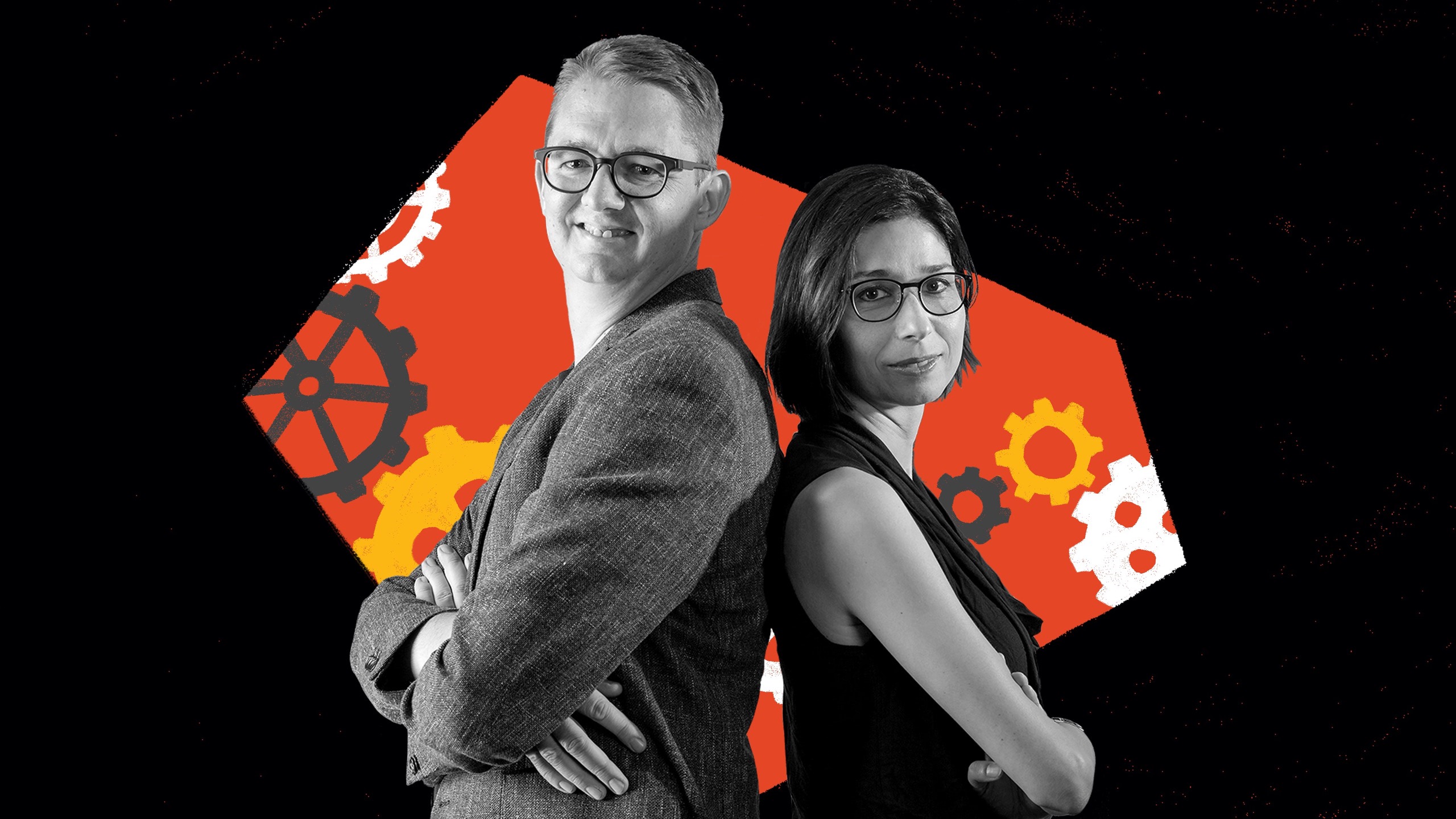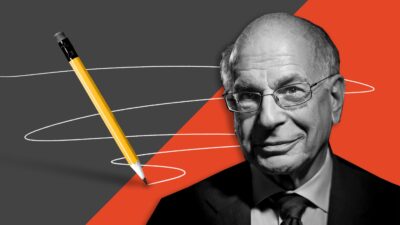Sandra Peter and Kai Riemer

Big ideas and work satisfaction on The Future, This Week
This week: real innovation between steam trains and convenience, and the automation paradox. Sandra Peter (Sydney Business Insights) and Kai Riemer (Digital Disruption Research Group) meet once a week to put their own spin on news that is impacting the future of business in The Future, This Week.
The stories this week
01:45 – Real innovation: from steam train to big ideas today
15:43 – AI is coming for your menial tasks
Other stories we bring up
Our previous discussion of how convenience trumps preferences
Jonathan Haidt on good intentions and bad ideas
Automation, the same old story
The story of time standardisation
Join us on 20 September 2019 for DISRUPT.SYDNEY™ 2019: Rethinking Success
DISRUPT.SYDNEY, in its seventh year, is Australia’s first and oldest disruption conference.
In recent years we talked a lot about what makes innovations disruptive. This year we’re looking at what it means to be successful in a world increasingly concerned with disruption, sustainability, inequality and changing notions of work.
With two Q&A panels, parallel workshops after lunch, and an interactive futures session on deep fakes in the afternoon DISRUPT.SYDNEY 2019 is shaping up to be another engaging highlight.
More information and registration
You can subscribe to this podcast on iTunes, Spotify, Soundcloud, Stitcher, Libsyn, YouTube or wherever you get your podcasts. You can follow us online on Flipboard, Twitter, or sbi.sydney.edu.au.
Our theme music was composed and played by Linsey Pollak.
Send us your news ideas to sbi@sydney.edu.au.
Dr Sandra Peter is the Director of Sydney Executive Plus and Associate Professor at the University of Sydney Business School. Her research and practice focuses on engaging with the future in productive ways, and the impact of emerging technologies on business and society.
Kai Riemer is Professor of Information Technology and Organisation, and Director of Sydney Executive Plus at the University of Sydney Business School. Kai's research interest is in Disruptive Technologies, Enterprise Social Media, Virtual Work, Collaborative Technologies and the Philosophy of Technology.
Share
We believe in open and honest access to knowledge. We use a Creative Commons Attribution NoDerivatives licence for our articles and podcasts, so you can republish them for free, online or in print.
Transcript
This transcript is the product of an artificial intelligence - human collaboration. Any mistakes are the human's fault. (Just saying. Accurately yours, AI)
Disclaimer We'd like to advise that the following program may contain real news, occasional philosophy and ideas that may offend some listeners.
Intro This is The Future, This Week. From Sydney Business Insights, I'm Sandra Peter and I'm Kai Riemer. Every week we get together and look at the news of the week. We discuss technology, the future of business, the weird and the wonderful and things that change the world. Okay, let's start. Let's start!
Kai Today in the future this week: real innovation between steam trains, and convenience and the automation paradox.
Sandra I'm Sandra Peter. I'm the Director of Sydney Business Insights.
Kai I'm Kai Riemer, professor at the Business School and leader of the Digital Disruption Research Group.
Sandra So Kai, reckon we should spend a few hours on narrating the Apple event?
Kai It's tempting. We're getting new iPhones, probably the both of us. We'll see how that goes. We could do Uber, there's been a couple of stories.
Sandra Uber should be a special episode, there's a lot there to unpack.
Kai There's a lot of automation kind of stories, that seems to be a thing again. Warnings, there's the one in CNN. You know, the same old, same old, all the jobs will disappear and the robots are coming for us. So that's not news.
Sandra I've got one from City Lab that I think we should do, it's titled "This is what the transport revolution looks like".
Kai OK, what's it about?
Sandra Trains.
Kai Trains?
Sandra We should definitely do trains.
Kai Steam train I see, yeah that's cool. But also this automation thing has an angle, and I think we should do the one in The Atlantic which is not about, you know, all the jobs are disappearing, but actually how work is changing, so that's a new angle we haven't seen that, so let's do that. Those two?
Sandra Those two.
Kai Let's start with the trains though. OK, Sandra, what happened in the future this week?
Sandra Well this didn't happen this week. This actually happened quite a while ago, to be exact about 150 years ago, and it concerns the opening of the Transcontinental Railroad. The article comes from City Lab and got my attention because it was titled "This is what the transport revolution looks like".
Kai Steam trains…
Sandra Yeah, steam trains.
Kai You need to explain that to me, steam trains is what a transport revolution looks like? Okay, that's interesting.
Sandra So the author Laura Bliss wanted to understand the true transport revolution and that was the way of escaping the current news cycle around transportation, which these days she says is mostly driven by techno speculation rather than actual innovation and real developments driven by Uber or Lyft's claims to completely abolish car ownership, or Elon Musk promising to take us to Mars, saw autonomous vehicles being everywhere.
Kai Or indeed share bikes. Remember those? We've seen a lot of those across the city for a few months and then they disappeared.
Sandra As we discussed on the podcast almost two years ago.
Kai There's a few new ones popped up, Lime Bikes with batteries so they're the next ones to disappear, if you have a look at the comments section and the ways in which they do and don't work. So they also make the point that this is not real innovation. This is just fiddling around the edges of the current transport system but steam trains back in the day in the eighteen hundreds was a magnificent innovation, a huge disruption to people's lives and also an opening up of an entire country.
Sandra So again to understand a few things about the future of business we're going to look at history, and in this case the author actually did go and drive an actual coal fired locomotive. So she was an engineer for the day on one of the locomotives on the Nevada Northern Railway that's somewhere in Ely, Nevada if any of our listeners want to go and try it out.
Kai Yeah, a remote town in Nevada, apparently. And she got to know the locomotive 40, known as 'the Queen' or the 'ghost train of old Ely', which was built in 1910. And today is run by a little collective who basically run this as a historic museum on wheels as an experiential museum for tourists and train enthusiasts.
Sandra But in terms of transport revolutions, these little engines and the Transcontinental Railroad actually did change everything so this was a true transport revolution. So forward to step back into the past for a second. First the Transcontinental Railroad drove the expansion and development of cities out westward.
Kai And as the name suggests, the railroad spans the entire continent from the Atlantic all the way to the Pacific in the end.
Sandra It changed communications because it opened the path for phone lines and for the telegraph.
Kai And most extraordinary, and I kind of knew this but had to actually look for the details, it actually gave us time and that is not just true for the US but it's actually a phenomenon more broadly in the world. It was the railroads that spanned the entire continent that for the first time made it necessary to coordinate time. So when railroads first started out, every part of the US had different local time, not time zones, and it could be 12:45 in one place and 2:30 in another and 2:47 in another place, so it was really all over the place. People were using the sun, the natural time, that was the official clock in the marketplace. But apart from this there was no coordination of time. And so what happened was it became incredibly complex to run trains across the continent and the timetables that were printed, the name actually originates from the fact that there was different time in every place which had to be coordinated which gave it the name timetable. It took more than 40 years since the publication of the first such timetables that the US finally agreed and implemented standardised time zones which happened on November 18 1883, fun fact.
Kai So time zones are a direct result of running railroads at speed across vast distances which made it necessary to coordinate time and to give us time, so to speak. Which is an extraordinary innovation if you think about it compared to, you know, things we call innovation today. That really changed people's lives and for the first time you could coordinate communication across an entire continent.
Sandra So time zones, telegraph, phone lines, carrying fresh produce, springing up new cities, moving the wounded around, moving even ice around the country. This was really a giant innovation project a true transport revolution. There are two interesting aspects that we want to focus on.
Sandra First is that to build and run this 19th century rail network it actually took a tremendous public-private partnership to execute. That meant that you had to have land grants for the private companies to build this, you had to have tremendous private capital to invest in what was a very, very long term project. You also had to have tremendous amounts of manual labour, which is also one of the dark sides of the Transcontinental Railroad where thousands of people died in the attempt to build this and entire native communities in America were killed or displaced to make way for this project, cheerful there, And also tremendous advances in engineering that were required to achieve this.
Sandra So first I want to focus on the public-private partnership. I mean this is not something that we're really seeing in the big transport innovations that we're faced with today.
Kai If think of Uber you see quite the opposite, right? You're seeing disruptors, innovators that are very much at loggerheads with regulation and governments that openly oppose government regulation. So, it's far away from public-private partnerships. We're still building roads and railways in that way, but it's not in the sense of pushing the envelope and innovating.
Sandra This is where I wanna raise another important point that the article makes, and that is around big ideas. The transcontinental railroad was one of these really big ideas and there was an interesting article in The Journal of Design and Science, which is a joint venture between MIT Press and the MIT Media Lab. And the article was by Nicholas Negroponte who was talking about the big idea famine and he was saying that he thinks that 30 years from now people looking back at what we were doing today will say that we didn't tackle the really big, really hard, really long term problems; he was talking in particular about the research but also around innovation. That the way we like to portray ourselves especially with narratives coming out of places like Silicon Valley, is that we are a disruptive and creative society, one where and entrepreneurship is widespread, where start-ups and big companies alike tackle big innovative projects, tackle moon shots. But rather than most of our accomplishments can only be counted in terms of the money that was made or the size of IPOs rather than big innovations.
Sandra And he's got a couple of examples and I just won the raise two of them. One relates directly to our transport revolution, which is he makes the point that the start-ups of today just focus on faultless ways to deliver food or entertain ourselves or do our laundry using yet another app and that often the real discoveries or the real technologies are trivialised by the startup process that they have to go through to meet the expectations of venture capitalists or early-stage investors. And he makes the point that for instance a startup using gene replication to make real sirloin steaks without cattle and very little water, actually was guided through the venture capital process into making leather instead to avoid the problems that would be posed by the Federal Drug Administration. Hence the VCs would get their money back on investment much faster, it would be cashflow positive much faster rather than tackling a really hard problem. But the idea was that these are not world-changing advancements but rather small incremental changes.
Sandra The second point around our current famine of big ideas was government involvement and we touched upon this a little bit with our public-private partnership. But he asked us to imagine classes of problems that will take ten or more years to fix, problems that are really hard to address where we see no economic return for a very, very long time where we have very large horizons but also very high risks, and solutions to those problems cannot be achieved by governments alone or by large private companies but required the types of cooperation that we haven't seen in a very long time. And indeed in the US and in other places, government labs in collaboration with universities used to serve this for a very long time. But investment is continually drying up and there are less and less bold investments. Rather the focus is on creating IP and creating short term returns as well.
Kai Yes, on the one hand, the structures that we are living in, investors in Silicon Valley and more generally venture capitalists want to divest fairly quickly they're not really interested in the entrepreneurship side of things, they are interested in monetizing their investments. We have at the stock market quarterly results to be published which means there's every incentive to optimise for short term gain rather than long term innovation. And it's actually quite interesting there was a story a few years back where Porsche, the German carmaker, refused to be listed in New York at the Stock Exchange because they said if they published quarterly results no one would be able to understand those because production is very uneven across the year and it wouldn't make sense.
Kai But it's very hard to resist this short term nature which flies in the face of these big ideas. You know these big projects but the other observation I wanted to make is you could say "but look at digital technologies and apps and Facebook and Google and they have brought about big changes to our everyday lives," which is true but they were not moonshot projects. They have brought about massive changes to our everyday lives, and this is the discussion that we've been having because a lot of those changes are not necessarily positive at least not for everyone, and certainly these companies didn't set out to bring about those changes. They are by-products of emerging changes, emerging innovation, they're unexpected then not nation-building, nation rallying moonshot or indeed "Mars-shot" programs.
Kai And so I want to tie this in with another observation, which will link us to our second story of the day. And that is that a lot of the innovation that we have today is incremental and it's driven by convenience, by making our lives incrementally easier, less effortful and for that very reason they are deliberately small innovations. They are small innovations which because you rolled them out at scale because they're digital and you can have millions of people use your apps food delivery or car-sharing, ride-hailing apps, the innovation that each brings is fairly small but because they happen at scale you make a lot of money out of them.
Sandra The article in The New York Times is actually titled "The Tyranny of Convenience" by Tim Wu came out last year, and does caution us not to presume that convenience is always good and that it actually has a very complex relationship to other things that we might care about. One of the ones that the article raises is that of preferences, that convenience might trump our preferences and we will choose certain things even though we disagree maybe with the values behind it or the business models that stand behind it because it's the convenient thing to do. It might be not the type of food that we would most enjoy eating but it's the most convenient food to eat.
Sandra Similarly, he points to the fact that inconvenience or difficulty or even labour is always seen as something to be avoided. Yet there are particular benefits to things being a little bit difficult of things being a little bit hard. We've recently had on the podcast as a guest, Professor Jonathan Haidt from NYU, whose last book "The Coddling of the American Mind," and we'll put all the links to the interview in the show notes, was talking about the fact that Generation Z, Generation Z, is one that's grown up without being exposed to anything difficult or anything that challenges their beliefs. And this has led to a generation that has very little resilience but also very little tolerance for difficult conversations, or for difficult engagements.
Kai And this is where I want to bring in the second story for today because we look at technology, we look at automation and what it does, and in our private lives we want everything more convenient. We automate things away things that no doubt have made our lives more pleasant, easier, no one would want to do without a washing machine or without their car. And so we like those conveniences, but with convenience driving much of innovation today we are outsourcing a lot of our decisions to algorithms: food choices, what we're going to watch, what we're going to read. So a lot of things are presented for us, we don't really have to expend much cognitive or indeed physical effort to go about our daily lives. Now the article in The Atlantic that we're discussing makes the point that what automation does at work, in the workplace, for many white-collar workers is actually the opposite which creates a real paradox and also a real problem.
Sandra The article is titled "AI is coming for your favourite menial tasks" from The Atlantic by Fred Benenson and the main point it makes is that as AI gets better and better at performing routine tasks in the workplace only stressful tasks will remain. Hence, this will transform the work experience in not a necessarily good way. And the author makes his point reflecting on the time when he was the Vice President for Data at Kickstarter.
Kai So the point he makes is that when Kickstarter started out his staff would take a lot of joy and pride in approving and then seeing to success those early successful projects on Kickstarter, they would gather in the office, they would celebrate. But then over time as the platform grew the backlog grew as well and people couldn't actually stay on top of vetting and approving projects. And so they had to automate some of that work, and obviously algorithms deep learning can deal with all the kind of normal tasks, they're really good when it comes to things that are straightforward. So what happened was that all of the kind of cases that were going to be obvious failures or inappropriate were rejected by the algorithm or the ones that were obviously going to be good and successful were approved by the algorithm and what people were left to deal with was all the kind of difficult cases the edge cases the one that were maybe good, kind of good. Which in turn did not give workers the same kind of satisfaction because the things that were really great projects were now approved by the algorithm whereas the kind of things that people would get to see were the things that were kind of meh, not that great.
Sandra So interestingly this is one of those articles that highlights the effects of automation and artificial intelligence on work and locates it not in the quantity of work that will be displaced, which is what many of the articles predicting forty percent of our jobs will disappear, half of our jobs will disappear. Not in the quantity of work, or workers that will be displaced, but rather in the quality of the employment. And often we've seen arguments that discuss the displacement of middle class jobs and the replacement of those occupations with lower-skilled lower-wage ones like driving on Uber or delivering food. But this article makes a more nuanced argument for the quality of the work where the tasks that are automated are actually the tasks that are fairly straightforward that do not require a high cognitive load.
Kai So the article makes the point that some menial aspect to work is actually part of what makes work satisfactory. So we often hear the point that yes, algorithms will come they will take away the menial parts of work and we should all be happy with this and so the work that is left is really the ones that need human judgment and creativity and all the rest of it. But the article points out that if all that you are left with is what the algorithm can't handle, the difficult judgment cases, but you don't get the joy out of getting some easy runs on the board with the decisions that are straightforward. Work is not the same, it can be stressful, it's less satisfying and actually leaves people unhappy with their jobs and going home without much of a sense of achievement.
Sandra So hang on because some people might call bullshit on us here. Isn't there actually a number of paradoxes in what we're saying? First, on the one hand, we're saying there should be more difficulty in our lives and we should have more challenges, but now we're complaining there are too many challenges.
Kai Yeah, you could look at it that way, but the problem here is that difficulty in a task is only good when you have a sense of achievement when you get to master a skill and actually the things we're talking about often involve menial parts, right? Sticking with the task, persisting. What we're talking about here is that work is actually deprived of these aspects and what we're left with is the complex, just the difficult not the fact that there is difficulty in our life. Work is just turned into this constant barrage of difficult decisions, complex things, organising things that the algorithms can't handle. So that's a very different thing to having difficulty in your life.
Sandra And then secondly you could argue here that what we want to automate at work is actually the boring, repetitive tasks that have a known outcome and this is why we actually welcome automation and artificial intelligence. It will free us up from all these menial tasks.
Kai So there's two things we can say here. First, we can't speak for everyone, there's probably people who like repetitive work, the kind of things that someone might automate someone else might actually enjoy. And I have this sometimes, I really don't like admin work but at the same time, if I have to do it, it sometimes gives me at least some sense of achievement. But the second point is that the things that can be automated oftentimes will be automated because it's a cost issue of course, it's an efficiency issue. And so we say that we're freeing up valuable time which is then expended on the more difficult things, so that's the response to the second seeming paradox.
Sandra And then there is a third problem that we want to highlight here. What seems now to be an increasing imbalance between what happens in our private lives where there's more and more convenience and less and less friction in every aspect of our lives. And at least for some of us, a work-life that is increasingly complex, increasingly ambiguous, increasingly demanding for which we don't seem to be properly prepared.
Kai And channelling Jonathan Haidt here, we could say that if a generation of workers who are used to an easy, convenient digital life enters the workforce where work is now, due to similar use of technology, more and more complex and ambiguous and requires resilience, we might actually have a problem that is in addition to the ones that Jonathan Haidt already points out when it comes to lack of resilience.
Sandra So where does this leave us? Do I have to give up my Uber to be better prepared for difficult work?
Kai So do I have to love doing my admin work, my receipt claims?
Sandra I think it leaves us in a place where we need to be more overall conscious of the choices we make and the trade-offs that we make for convenience in our lives, but also in the way we design our jobs and our work. Most of us are involved and do have a say in how jobs are designed and what we choose to do and not choose to do at work, but also in how we make choices in our private life. But there is also maybe a bit of space here to do more research. Obviously, some of these problems are a little more complex than first thought and the space that we need to occupy with some of this research is not restricted to either the workplace or our private life, but now is increasingly diffuse so maybe a new paper title in order?
Kai Well you could envision several because I do think there's genuine need for more research around what automation does to work. But here's one: "The automation paradox: the increasing difficulty of work in a world of convenience."
Sandra The other thing we might be more mindful of is how we really find success in this world. What does it mean to be successful, both in terms of innovation if you think about the big ideas and our first story, but also in terms of the individual given our second story?
Kai And this is where we would like to invite everyone to consider coming to Disrupt Sydney in Sydney on the 20th of September, it's a full-day event. Information at www.disruptsydney.net and the theme is indeed rethinking success and we're looking at the full bandwidth from economic success, success in life,and success in the workplace. And that's all we have time for today. See you soon.
Sandra On the Future…
Kai Next week.
Sandra This week?
Kai Yes but next week.
Sandra On The Future, This Week. Next week. Thanks for listening.
Kai Thanks for listening.
Outro This was The Future, This Week made possible by the Sydney Business Insights team and members of the Digital Disruption Research Group. And every week right here with us, our sound editor Megan Wedge who makes us sound good, and keeps us honest. Our theme music was composed and played live on a set of garden hoses by Linsey Pollak. You can subscribe to this podcast on iTunes, Stitcher, Spotify, YouTube, Soundcloud, or wherever you get your podcasts. You can follow us online on Flipboard, Twitter, or sbi.sydney.edu.au. If you have any news that you want us to discuss please send them to sbi@sydney.edu.au.
Kai When, when did that when did the railroad start out? And so it took about, hang on, it took about, uhhhhhh…
Sandra Get to it.
Kai Sorry, no no.
Megan Are you showing us how long it took?
All Laughter
Sandra Megan, you should be on this podcast.
Kai And it took, it took more than 40 years since the-
Sandra Yes, it did.
All Laughter
Close transcript







